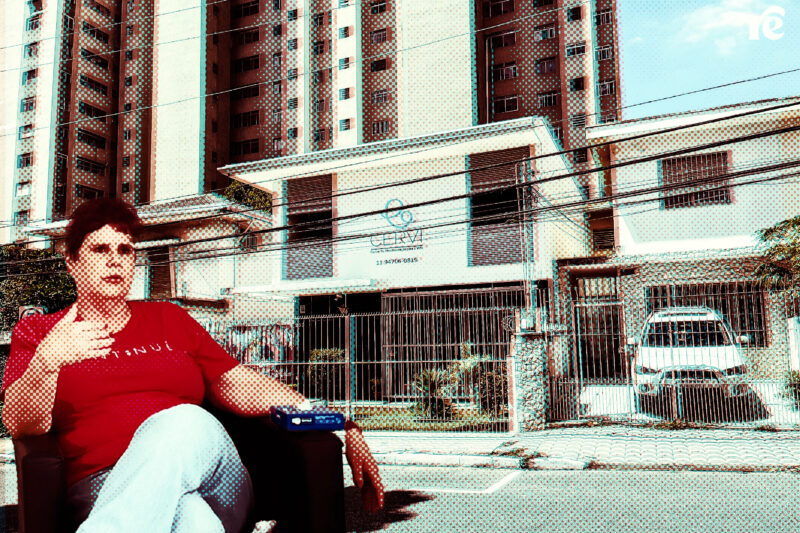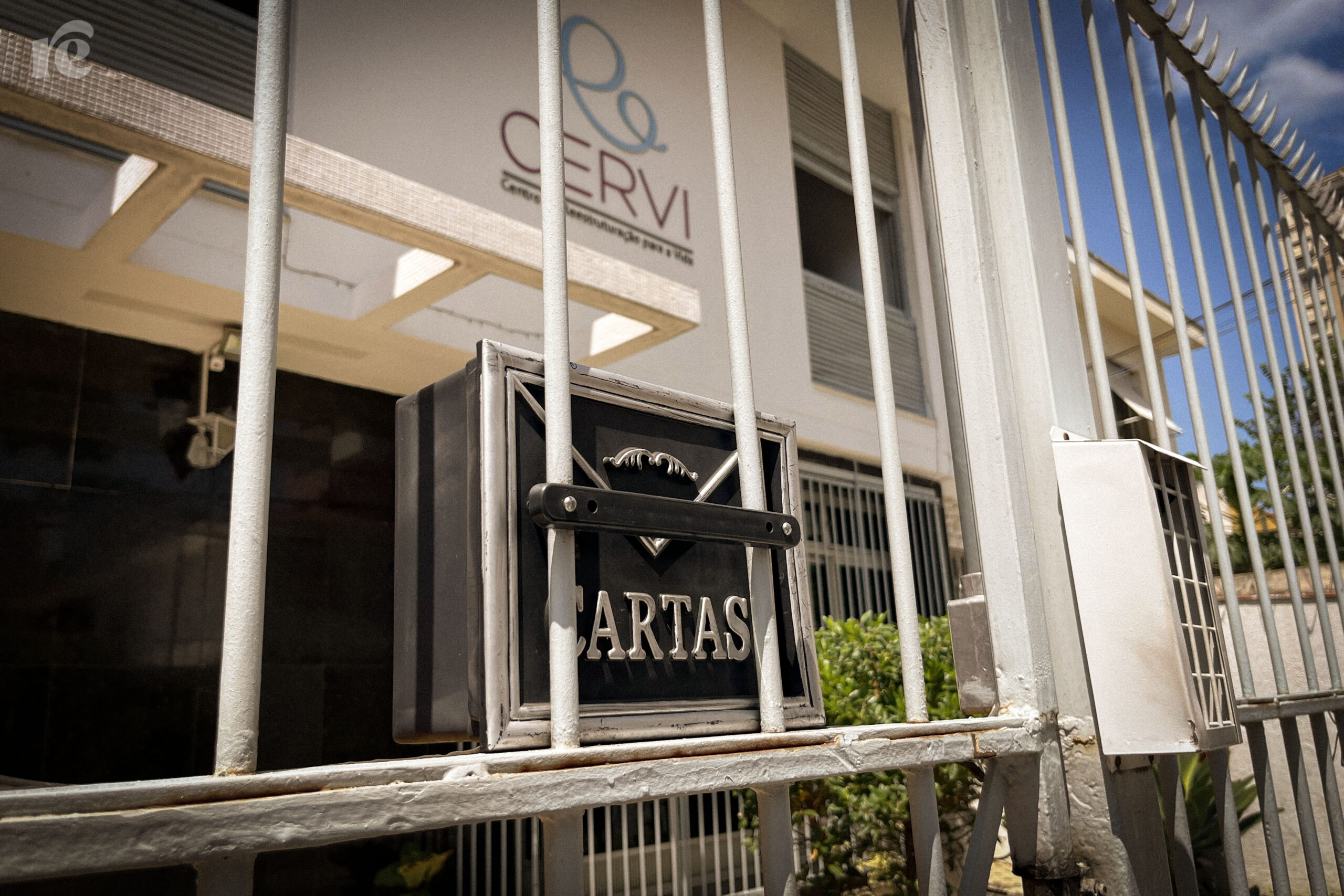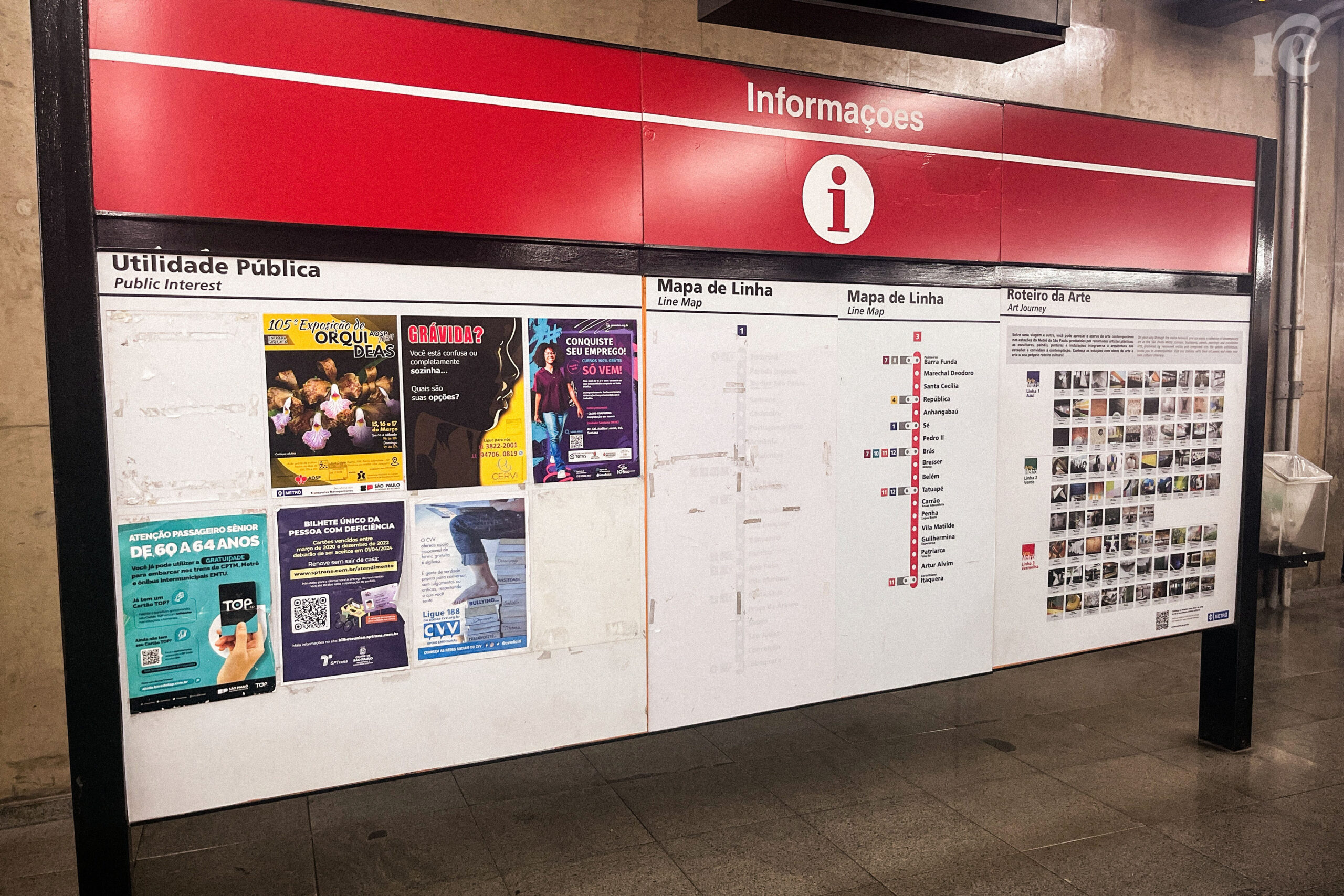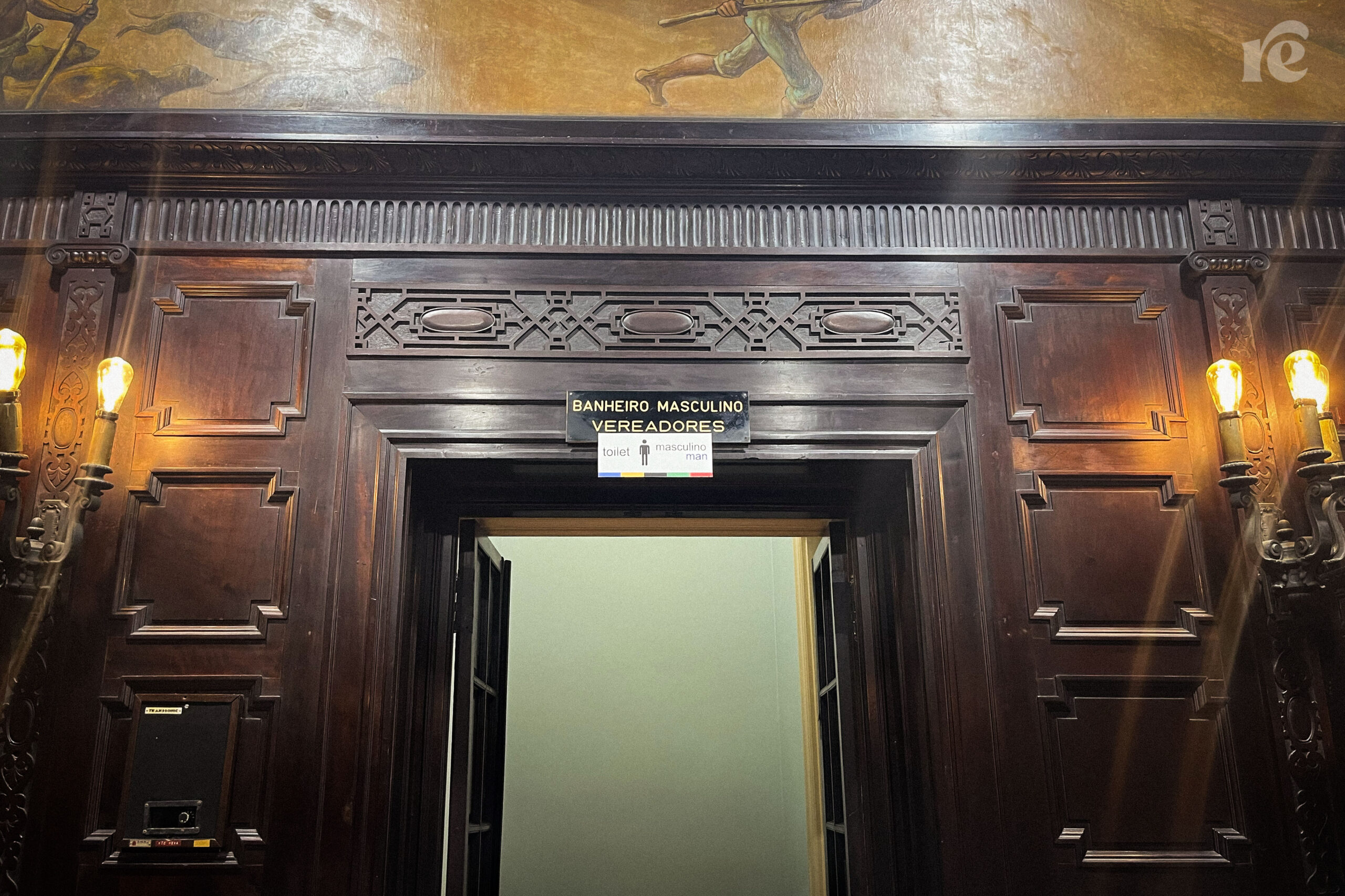Members of Brazil’s Far-Right Are Importing U.S.-Style Anti-Abortion Tactics
Abortion is already illegal in Brazil with few exceptions, but anti-abortion groups are increasingly taking steps to interfere with abortion seekers, including importing the "crisis pregnancy center" model.

This reporting was supported by the International Women’s Media Foundation’s Reproductive Health, Rights, and Justice in the Americas Initiative. Check out part two here.
On a quiet street in a well-to-do neighborhood of São Paulo sits a generously sized house. The first-floor exterior is black, the top floor painted a bright white that reflects the sun with a near-electric intensity. Like most on the block, the property is shielded by a tall gate.
A sign printed on the white exterior of the upper floor says “CERVI: Centro de Reestruturação para a Vida” in blue and purple. Center for Life Restructuring. There are no other clues as to what’s inside.
In some of the busiest stations of the São Paulo metro, the same logo appears on the bottom right corner of posters that leave less to the imagination. “GRÁVIDA? Você está confusa ou completamente sozinha… Quais são suas opções?”
“PREGNANT? Are you confused or completely alone… What are your options?”
Sound more familiar? That’s right: CERVI is a “crisis pregnancy center.”
Also known as anti-abortion centers, CPCs are designed to manipulate and deceive people seeking abortions. They are also one of the anti-abortion movement’s most effective platforms for recruiting and radicalizing new members—and spreading misinformation.
In the United States, there are more than 2,600 CPCs, and potentially as many as 4,000. Despite their nonprofit status, they’re also a big business: A Rewire News Group investigation published in August found that these centers are likely taking in and spending more than $1 billion per year in the United States.
In Brazil, abortion is only legal in three cases: to save the pregnant person’s life, in cases of rape or incest, and in cases of fetal anencephaly, a condition where the fetus is missing parts of the brain or skull. According to Tatiana Campos Bias Fortes, the coordinator of a division within the São Paulo Public Defender’s office dedicated to protecting women’s rights, people whose pregnancies are otherwise incompatible with life may also petition in court for permission to have an abortion. However, the process can be arduous.
Fourteen U.S. states now ban abortion, and seven more limit abortion access earlier than they did under Roe v. Wade. Still, Brazil remains a far more restrictive context—but that doesn’t mean fewer people need abortions. And increasingly, Brazilian activists, politicians, and religious organizations are importing CPC-style tactics in an attempt to delay and confuse people looking for abortion services, in some cases by spreading misinformation and, in others, by interfering directly.
“Our main work … is with women’s self-esteem”

Rewire News Group’s previous investigation into CPC finances revealed that many of the U.S. centers—despite their ubiquity and extensive budgets—serve very few people. I was curious as to whether the same is true in Brazil, so I visited CERVI three times in March to try and get a sense of its presence in the community.
In a nearby nail salon, a woman busy opening up for the day said she had never noticed CERVI. But in another aesthetics salon down the block, I immediately spotted CERVI flyers on the desk. I was with Brazilian journalist Roberta Fortuna, who asked the receptionist what she knew about the place. They had helped her former coworker, the woman said. They gave her food when she was pregnant.
“We don’t do that a lot,” said CERVI’s founder, Rosemeire Santiago, when I recounted this story to her. CERVI is not interested in “only giving out, without doing anything,” she continued. “We help them to have a profession, not only give me, give me, give me. Otherwise, there would be no reason for working with women.”
She was also eager to distinguish CERVI from CPCs in the United States.
“We don’t do brainwashing with them,” said Santiago, describing CERVI’s approach with clients. “And this is something that I think it makes a huge difference from, for instance, the pregnancy centers in the U.S. We’ve learned that we cannot judge anybody. We cannot tell them, ‘You are a murderer.’ … But what we’ve seen is that because of the support, many of them give up an abortion.”
I asked Santiago if trying to prevent or stop people from having abortions is CERVI’s mission.
“I wouldn’t say that,” she said. “I would say that offering them support would make a difference … We are not gods. I would say we don’t stop people doing anything. We offer them options.”
However, a reporter from the Brazilian investigative journalism organization Agência Pública who went into CERVI undercover was incorrectly told by a CERVI social worker that abortion is completely illegal in Brazil, including in cases of rape. The social worker said that no abortion procedure is safe, and that “you run the risk of losing your uterus” in an abortion. She, too, claimed she wasn’t trying to brainwash the reporter.
Santiago, a psychologist by training, said psychological support is a cornerstone of CERVI’s offerings, along with job training. She also mentioned a recent abuse prevention workshop. When I asked her to describe it, she said some of the curriculum focused on keeping children out of situations that could lead to abuse, but the workshop was largely dedicated to helping women “to be strong enough to face the abuser at home.”
“Our main work, I would say, is with women’s self-esteem,” she said.
Santiago said people typically find CERVI via social media, word of mouth, or the metro advertisements. But sometimes, they are referred by public hospitals and clinics.
According to Santiago, CERVI has served about 10,000 clients for a total of 21,000 visits or services since its opening in 2000. That’s roughly 416 clients per year in a city of more than 12 million.
CERVI’s surprising ties to Michigan

Several U.S. anti-abortion organizations have been working for years to export the CPC model abroad. Chief among these is Heartbeat International, which, according to its website, has “over 971 affiliate locations outside the United States.” Heartbeat partners with Centros de Ayuda para la Mujer (CAM), a Mexico-based CPC network whose website claims 70 centers within Mexico and 130 more throughout Latin America. CAM is also supported by the similarly named U.S.-based Human Life International.
CERVI, however, is not a Heartbeat affiliate, at least not officially. It was founded at the invitation of a Grand Rapids, Michigan-based CPC simply called Pregnancy Resource Center. PRC now has an associated international outreach arm called Life International (not to be confused with Human Life International).
Life International boasts that its Grand Rapids headquarters “began its life as a Jewish synagogue in the late 19th century” and later “housed West Michigan’s largest abortion clinic.” It appears to have purchased the building out from under the abortion clinic previously located there, a common CPC tactic.
As to the genesis of CERVI, Santiago said she used to work in international adoption. Brazil’s regulations around international adoptions are strict, so such arrangements are typically only considered for sibling groups, older children, and disabled children. While traveling in the United States to meet potential adoptive parents, Santiago said she was invited to visit PRC, whose leadership suggested she open a center in Brazil.
“At that time, I don’t know if there was any organization like that here,” Santiago said. I asked whether CERVI’s association with Life International was still active. “Not really,” she said.
However, on its most recent form 990 financial disclosure, Life International reports grants totaling $11,750 to organizations in Latin America and the Caribbean. No other Latin American affiliate is mentioned by name on its website. “CERVI crisis pregnancy center celebrates 15 years of serving São Paulo, Brazil, and beyond,” reads a post on Life International’s website from 2015.
Interestingly, most of Life International’s spending—which totaled $2,147,949 in 2022—went toward salaries, travel, and “special events.” Its direct grants to international organizations totaled just under $213,000.
Political connections and public funding

Most CPCs in the United States are religiously affiliated. CERVI receives support from both Evangelical and Catholic groups, but CERVI itself has no official religious affiliation, Santiago said.
In fact, she added, CERVI helped another group open a center in Porto Alegre, a city in Brazil’s southernmost region. But because that center decided to become officially affiliated with a church, they had to change the name slightly, to SERVI. Santiago has advised another group working to open a center in the capital, Brasilia, though it has not opened yet.
“We are not affiliated to any church, nor do we have politics here,” Santiago said. “Your political issues here are not welcome, because it can give a lot of headaches … we work with people, not with positions.”
However, Santiago herself ran for office in 2022 on an explicitly anti-abortion platform. She also campaigned in support of the Estatuto do Nascituro, or Statute of the Unborn Child, a proposed law that would eliminate the few exceptions to Brazil’s abortion ban.
During our interview, Santiago shared several stories of children born because their mothers chose not to have abortions after visiting CERVI. One girl, she told us, came to CERVI in its early days, pregnant as the result of a rape. Initially, she wanted to have an abortion, but decided not to. Her son is now a concert violinist.
Santiago also deployed this story in a 2019 public hearing on a measure that would have decriminalized abortion in the first trimester in Brazil. She had the boy play an excerpt of Vivaldi’s “Four Seasons.”
“I do belong to some pro-life groups. But me, Rose, not CERVI,” Santiago said.
But CERVI’s social media is full of highlights from Santiago’s lobbying. A recent post shows footage from a meeting of anti-abortion leaders hosted by Partido Liberal Mulher, the women’s outreach arm of Partido Liberal, the political party of far-right former President Jair Bolsonaro. Featured in that post and others on CERVI’s page is Chris Tonietto, a federal deputy and another major anti-abortion political voice in Brazil.
Santiago’s connections with Brazil’s far right are extensive. Among CERVI’s biggest supporters are the Gandras, a powerful family with links to the ultraconservative Catholic organization Opus Dei. When Bolsonaro was in office, one member of the family, Angela Gandra, served as national secretary for the family in the Ministry of Women, Family, and Human Rights. She and Damares Alves—then the minister of women, now a senator—were anti-abortion leaders within the Bolsonaro administration. Alves was also one of several far-right figures in Brazil who tried to prevent a ten-year-old victim of incest from having an abortion in 2020.
While most of their funding still comes from private donors, CPCs in the United States rake in millions in public funds each year—though pressure is mounting in many states to end this practice. CERVI appears to be pursuing a similar model.
According to Pública’s investigation, CERVI received over 170,000 Brazilian reais (just over $33,500) in public funds between 2019 and 2023. “Of that, 100,000 Brazilian reais came from the National Department of Women’s Policy, which is part of the Ministry of Women, Family, and Human Rights created by former president Jair Bolsonaro,” and headed by Alves at the time, Pública reported.
When I asked Santiago about government funds, she mentioned only the 70,000 reais that came from São Paulo’s local government. Santiago claimed this money was strictly to pay professionals for the classes and training they offered to CERVI’s clients, but according to Pública’s investigation, the official purpose of the money was “procurement of equipment.”
Another CERVI Instagram post from last year advertises a “documentary” made in collaboration with Brasil Paralelo, a pro-Bolsonaro media company. Liana Cirne, a law professor and Workers’ Party councilwoman in the northern city of Recife, describes Brasil Paralelo as not just a website, but rather “the Netflix of the Brazilian far right.” The company was sanctioned by a Brazilian electoral court in the lead-up to the 2022 presidential election, and remains a key target of lawmakers’ efforts to tamp down on “fake news.”
Religious interference

While CERVI may be the most prominent U.S.-style CPC in Brazil, there are likely more.
Another organization with very explicit U.S. connections is Brazil4Life, whose founder Ina Braniff lives in Chicago and works as a translator, according to her LinkedIn.
“The very day I moved to Chicago, I heard a ‘March for Life’ promotion on the radio,” reads a note from Braniff on Brazil4Life’s website. “I got involved with the local pro-life movement. I volunteered at one of Chicago’s pregnancy centers and that experience resulted in my decision to open Crisis Pregnancy Centers all over Brazil.” Social media suggests that Braniff is friends with Rebecca Kiessling, a U.S. lawyer who advocates against rape exceptions to abortion bans.
Brazil4Life’s website claims the organization has more than 40 centers across Brazil, “many connected with local churches,” but it provides no details about where the centers are. The Brazilian publication Aos Fatos reported last year that Brazil4Life spreads misleading information through fake profiles on social media and directly via WhatsApp.
The website for CAM, the Mexico-based CPC network, reports eight affiliates in Brazil; the Heartbeat International directory shows seven official Heartbeat affiliates, plus CERVI and CENPLAFAM, an organization dedicated to educating people on the Billings Ovulation Method, a fertility awareness-based contraceptive method.
A 2018 investigation from Pública found that one CAM affiliate, run by a priest, misled abortion seekers via a now-defunct website called Gravidez Indesejada, or Unwanted Pregnancy.
Many of the CAM affiliates appear to be small religious associations, of which there are many in Brazil that engage in anti-abortion activities. For example, in 2022 a religious association called Filhos da Luz (not a known affiliate of CAM) began harassing a woman who was authorized to have a legal abortion because of a fatal fetal diagnosis.
Filhos da Luz appeared to have private details—including the woman’s direct contact information—that could only have come from her lawsuit, said Fortes, the public defender in São Paulo. After the public defender’s office filed suit against Filhos da Luz, the organization effectively disappeared, likely changing its name, Fortes said. Her office wasn’t able to push the case any further.
I asked Fortes if she was worried about other similar invasions of privacy. “We are,” she said. “But I’m going to be honest, we are more concerned with the general state of abortion access … at this point we are working harder to make sure the women can have an abortion.”
Some religious leaders have even exploited the legal system to stop abortions. For example, in 2005, a Catholic priest prevented a woman named Tatielle Gomes from having an abortion by obtaining a writ of habeas corpus, or preventative court order, on behalf of the fetus. According to several experts, this tactic is becoming more common across Brazil.
ANIS Institute of Bioethics, one of Brazil’s foremost legal organizations advocating for abortion rights, represented Gomes in a suit against the priest. They ultimately prevailed—15 years later. The priest was ordered to pay restitution, but he didn’t have the money. In March, his religious association, called Associação Pró-Vida de Anápolis, was finally held responsible. The organization’s assets are now frozen until it pays Gomes and her husband around 581,000 reais.
That priest, whose name is Father Luiz Carlos Lodi, is one of the people featured in CERVI’s recent Instagram post from the Partido Liberal Mulher event, along with Chris Tonietto, Brazil4Life’s Brazil coordinator Vera Ribeiro, and leaders of several more Brazilian anti-abortion groups.
Mariana Della Barba, Maria Martha Bruno, Júlia Das Carneiro, and Roberta Fortuna contributed reporting to this project.
